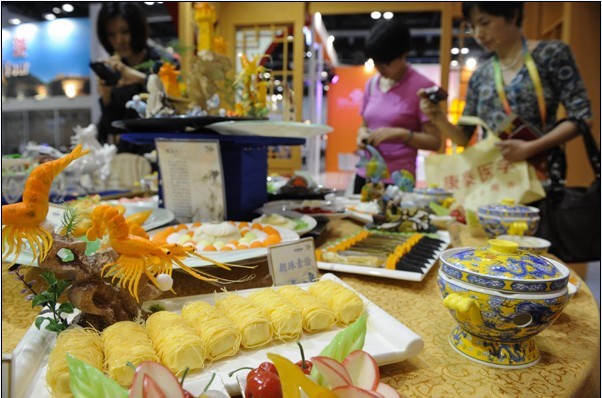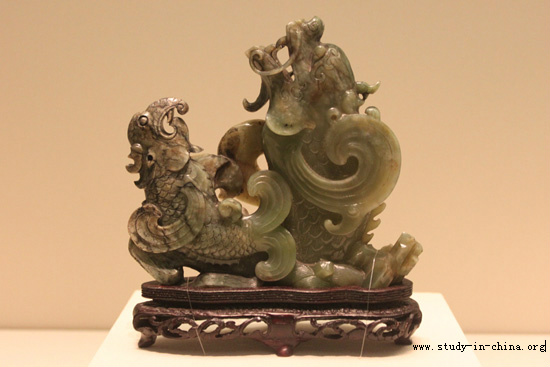| Home > China Feature |
Guard against stomach problems in the cold
Warm foods are recommended in winter, and spleen-benefiting herbs are advised to add to soups.
Jessie Chen will never forget having to stick a nuan bao bao (bandage that emits heat under the clothes) every day on her stomach once she became ill.
The 27-year-old white-collar worker recently suffered from continuous vomiting that was diagnosed by the doctor as acute stomach inflammation.
None of the friends she had dinner with the night before she fell ill complained of any symptoms, so she suspects that lingering outside in the cold air after dinner in thin clothes may have been the cause.
"The doctor told me that I should protect my stomach by keeping it warm," says Chen.
Generally, the digestive system enters an active stage in winter and that's why dietary reinforcements are usually more effective than in other seasons, according to Dr Wang Xiaosu, chief physician of the Gastroenterology Department of Yueyang Hospital attached to Shanghai University of TCM.
But stomach problems also often occur due to cold air, eating unsafe foods like hot pots, and stimulating spicy foods, she says.
"Though cold air arouses people's desire to eat more food, it also largely increases gastric acid, which may pose a threat to the gastric mucosa," says Dr Wang,
"There is a high recurrence of chronic stomach problems like ulcers in the winter and some patients even suffer stomach bleeding."
In addition, the cold environment may also arouse uncomfortable stomach contractions.
Wearing enough clothes and avoiding cold environments shortly after eating are good strategies for protecting the stomach, especially for people with chronic problems, she says.
As the stomach is close to the abdominal wall, with little protection from surrounding muscle or fat, pathogenic cold may easily result without proper insulation.
Also, cold food should be avoided to reduce stimulation of gastric fluids, especially at breakfast. As most of the organs are still in a state of sleep, eating cold foods may result in contraction and poor blood circulation in the digestive system, leading to indigestion.
Warm or relatively hot foods, however, can help stimulate blood circulation and wake up the organs. Wearing a belly belt, or nuan bao bao, can also help protect the stomach from the cold.
Dr Wang also suggests warming fruit with hot water, or briefly boiling it, before eating. Generally, the antioxidant like polyphenol in fruit won't be damaged at 100 degrees Celsius. Boiled fruits will effectively nourish organs, move bowels and promote digestion, as well as reduce possible stimulation in the stomach.
But foods rich in vitamin C, such as kiwi, orange, pomelo and strawberry, should not be boiled for long, as the temperature may destroy the vitamin. Dr Wang advises not to heat these fruits for more than five minutes.
"Adding a little spice in food can help warm up and improve the appetite, but too spicy foods will only arouse too much stimulation to the stomach and cause problems," says Dr Wang.
For those who rarely eat spicy foods, digesting a large amount at once may lead to acute stomach inflammation.
And since immunity decreases with cold temperatures, we should also be aware of infectious digestive ailments with typical symptoms like diarrhea and vomiting. Uncooked foods are the first group recommended to be crossed off the menu.
Hot pots, many people's favorite in the season, are also not advisable because dipping the food in boiling water may not be enough to kill off any germs.
"Most people prefer tender meats without long heating but the cost may be high as they are much more dangerous than well-cooked ones," says Dr Wang.
"Warm" (yang energy) foods like mutton, beef and jujube are more recommended in the season. It is also advised to add spleen-benefiting herbs, like yam, pearl barley, dang shen (radix codonopsitis) and bai shu (atractylodes macrocephaia) to food, especially in soups.
As for patients with chronic stomach problems like inflammation or ulcers, it is essential to quit smoking, drinking and eating other stimulating foods as well as avoid bad moods and fatigue. It is also advised to take precautionary medicine to stop relapses of stomach problems, according to Dr Wang.
See a doctor if you have stomach pains as taking medicine without professional advice may aggravate the problem, she says. For example, people may take painkillers for stomach pain but some could cause adverse reactions or even ulcers and bleeding.
Art
 more
moreChina Beijing International Diet ...
Recently, The hit CCTV documentary, A Bite of China, shown at 10:40 ...

Exhibition of Ancient Chinese Jad...
At least 8,000 years ago, Chinese ancestors discovered a beautiful...

Longmen Grottoes
The Longmen Grottoes, located near Luoyang, Henan Province, are a tr...

Custom
 more
moreWeb Dictionary
Martial Arts
Tai Chi Master Class Held in Moscow
MOSCOW, June 15, 2016 (Xinhua) -- Students learn from Shaolin ...
Celebriting 70 years' efforts in restoring Mogao...
Work is being carried out at the restoration site of cave No 98 a...
Hong Kong Children's Symphony performs in Seattle
Under the theme of Tribute to the Golden Age, a concert featuring a ...





 print
print  email
email  Favorite
Favorite  Transtlate
Transtlate 








